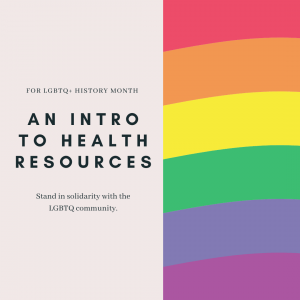Its near the end of LGBTQ+ History month so we are focussing on LGBTQ+ mental health and wellbeing research in connection with the COVID-19 pandemic.
Before COVID-19
In 2018 (Stonewall), research showed that half of LGBT people experienced depression in the previous year. Many faced widespread discrimination in healthcare settings and one in seven LGBT people avoided seeking healthcare for fear of discrimination from staff. You can find the full report at https://www.stonewall.org.uk/lgbt-britain-health
The COVID-19 effect
As a nation, the effect of the COVID-19 pandemic means that mental health decline in general has reached a peak but the effects on the LGBTQ+ population has been particularly difficult with much of the community feeling isolated. In 2020, the Guardian reported findings from research by University College London (UCL) and Sussex University that found that younger people confined with bigoted relatives were the most depressed (Batty, 2020)
Young LGBTQ+ people
The youngest members of the LGBTQ+ population, including LGB adolescents and transgender children and teenagers have also suffered during the pandemic. International transgender rights groups have warned that the lockdown has exacerbated the current crisis and that trans people over the age of 18 have been denied healthcare or had surgeries delayed. For young people under the age of 18, their mental health has been compromised due to the outcome of the recent court case which stopped many trans youth from receiving timely healthcare in the form of puberty blockers. For trans children, it is extremely important that they can pause puberty due to the mental health effects of going through natal puberty. The British Medical Association recently affirmed its position that transition-related care should focus on delaying puberty. In a debate held at the BMA’s annual representative meeting, Grace Allport from the BMA northwest regional council said it was
“disappointing to hear the statements and leaks coming from the Government, threatening to row back the rights of transgender people and to deny healthcare to under-18s who experience gender dysphoria. It’s important for us to pass this motion now to protect the rights of transgender and non-binary people” (Trueland, 2020)
Older LGBTQ+ people
The University of Lincoln also has some fantastic research underway. Dr Michael Toze, lecturer in Public Health and Social Determinants of Health is working with a small group of UK university researchers exploring the effects of COVID-19 on older LGBT+ people. The report summarises the preliminary findings. Several other publications of more detailed data analysis are underway. The research found that older LGBT+ people live very diverse lives and have employed existing coping strategies, but many also had greater challenges due to estrangement, accessing services or experience of isolation. The research will be continuing alongside other ongoing projects and with subsequent publications planned. For more information about the project, see the website at https://covid19olderlgbt.wordpress.com/
University of Lincoln resources
The University Library has a wealth of resources for finding high quality articles and other material on subscribed databases. Databases such as CINAHL (nursing and allied health database), Medline (medical and health database) and APA PsycINFO (psychology database) provide indexing and full-text of the top journals and publications available and literature covers a wide range of topics. At the University of Lincoln Library, we access these databases through the EBSCO platform and this allows you to search all three simultaneously.
We also have access to Coronavirus Research Database via the platform Proquest which is a free health and medical research database for openly available content related to the COVID-19 pandemic. It’s also possible to select other databases to search alongside it, including the Applied Social Sciences Index and Abstracts (ASSIA).
For an introduction, take a look at this short (10 minute) online demonstration of these resources:
References
Batty, D. (2020) Lockdown having ‘pernicious impact’ on LGBT community’s mental health. The Guardian, 5 August. Available from https://www.theguardian.com/society/2020/aug/05/lockdown-having-pernicious-impact-on-lgbt-communitys-mental-health [accessed 26 February 2021]
Stonewall (2018) LGBT in Britain – Health. London: Stonewall. Available from https://www.stonewall.org.uk/lgbt-britain-health [accessed 26 February 2021]
Trueland, J. (2020) Push for progress on transgender rights in healthcare [blog] 16 September. Available from https://www.bma.org.uk/news-and-opinion/push-for-progress-on-transgender-rights-in-healthcare [accessed 26 February 2021]
Westwood, S., Hafford-Letchfield, T., and Toze, M. (2021). COVID-19 and older LGBT+ people [blog]. Available from https://covid19olderlgbt.wordpress.com/ [accessed 26 February 2021]
Westwood, S., Hafford-Letchfield, T., and Toze, M. (2021). The impact of COVID-19 on older lesbian, gay, bisexual and/or trans+ (LGBT+) people in the UK: A rapid response scoping study SUMMARY REPORT. ResearchGate. Available from https://www.researchgate.net/publication/349181283_The_impact_of_COVID-19_on_older_lesbian_gay_bisexual_andor_trans_LGBT_people_in_the_UK_A_rapid_response_scoping_study_SUMMARY_REPORT [accessed 26 February 2021]



